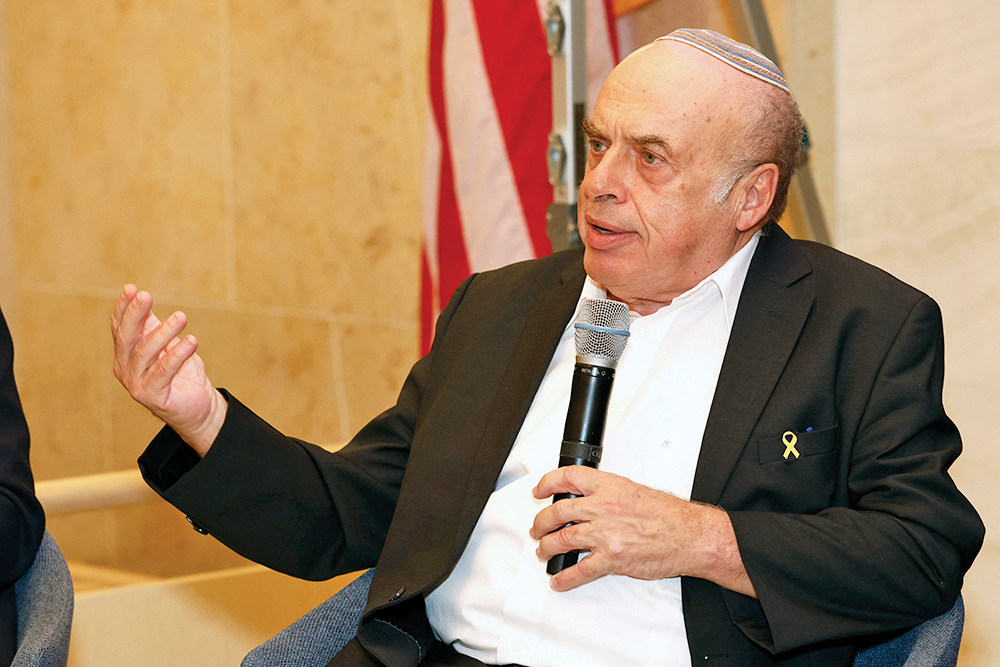
(Credit: Creative Image / The Rabbi Sacks Legacy)
A celebration of the 20th anniversary edition of Rabbi Lord Jonathan Sacks, zt”l’s book “A Letter in the Scroll” was held on September 4 at the Moise Safra Center in Manhattan.
At the outset of the event Natan Sharansky, Jewish leader and former Soviet refusenik, was announced as the chair of the Rabbi Sacks Legacy Global Advisory Board.
In a press release commenting on his new role, Sharansky (who wrote the foreword for the new edition of the book) said: “Rabbi Sacks was a moral lighthouse, and his light is needed more than ever in these dark times. That’s why I have chosen to accept the chairmanship of the Rabbi Sacks Legacy’s Global Advisory Board to ensure his timeless teachings on Jewish identity, personal responsibility, and the fight against antisemitism reach every corner of the world.”
The focus of the event was a panel discussion moderated by Dan Senor, author of “Start-Up Nation,” with Sharansky, Michal Cotler-Wunsh, Israel’s special envoy for combating antisemitism, and Rabbi David Ingber, founding rabbi of Romemu and senior director of Jewish Life at 92NY, highlighting the continued relevance of “A Letter in the Scroll.”
In his book Rabbi Sacks wrote, “I am a Jew because only if I remain a Jew will the story of a hundred generations live on in me.” It is these words which served as a springboard for the discussion.
Reflecting on how Rabbi Sacks’ teachings have guided her, Cotler-Wunsh stated: “I lean on Rabbi Sacks’ teachings to be able to try and make accessible to young and not-so-young Jews what it is that we’ve seen” on October 7 as well as the responses to October 7.

“[I]t is what [Rabbi Sacks] speaks about, very importantly, of the mutation of antisemitism, the oldest hatred in the world.”
Cotler-Wunsh emphasized the importance of the International Holocaust Remembrance Alliance (IHRA) definition of antisemitism in fighting this “tsunami of antisemitism.”
“Whether it’s in school, or in university, or at work, or in the city that you live in, or with regards to the legislators who represent you, or at the White House strategy. In whatever capacity you can impact, the [IHRA] definition has never been more important if we are to be able to identify and combat all strains of what is as Rabbi Sacks describes an ever-mutating, shape-shifting virus.”
Significantly, Cotler-Wunsh stated that in Israel,140% of those who were called up on October 7 showed up, and that we too “have to show up 140% of the time and not wait for someone else to be doing it. There is no one else. It is on us. Each and every one of us.”
Reflecting on those who may now have difficulty connecting with their Judaism, Rabbi Ingber stated that Rabbi Sacks’ book is one in a long line of works throughout Jewish history geared, in a way, towards those who are not religiously engaged.
“[He] was trying to create a positive Jewish identity rooted in ‘Why be Jewish’? Because it’s beautiful. Why be Jewish? Because it’s compelling. Why be Jewish? Because it will change your life for the better. Why be Jewish? Because we are proud to be the inheritors of an oeuvre of literature and ideas that have changed the face of humanity.”
Also addressed during the evening was the issue of campus antisemitism. Sharansky stated: “I was fighting with antisemitism on the campuses 20 years ago; that was the most important battlefield. … I spent a lot of time on American campuses.
“With all my experiences, with all my understanding about campuses, I could never imagine … that so easily public opinion can abandon the principles upon which America lives.”
In these difficult times, the voice of Rabbi Sacks (1948–2020), former chief rabbi of the United Kingdom and one of the most respected Jewish thinkers of our times, is tremendously missed.
There is no better time than now to immerse ourselves in his teachings.
For more information on the Rabbi Sacks Legacy, see www.rabbisacks.org.
Judith Falk is the creator of the Upper West Side Shtetl Facebook Group. You can follow her on instagram @upperwestsideshtetl. She is a lawyer by day and a former legal reporter.









